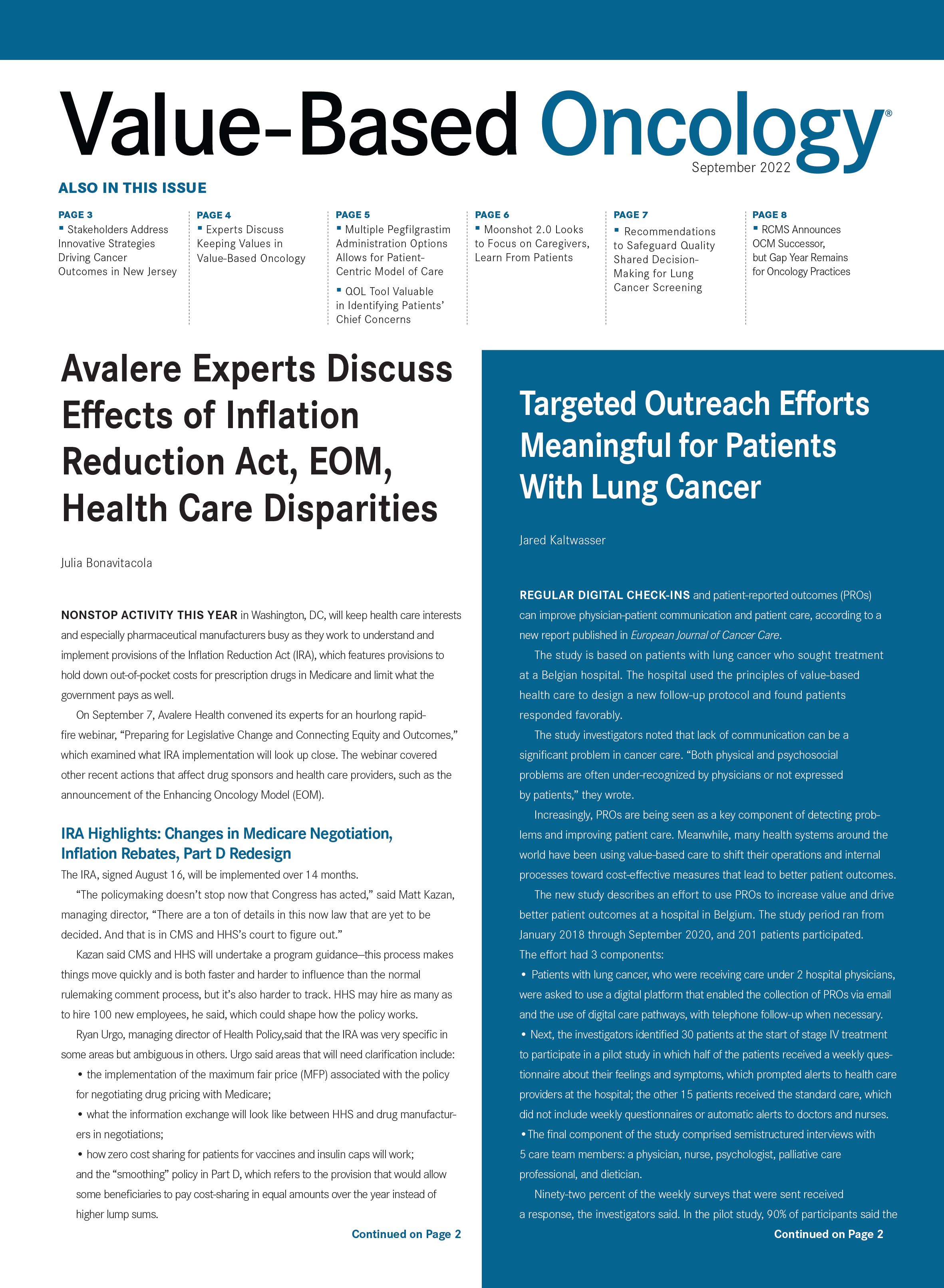- Center on Health Equity & Access
- Clinical
- Health Care Cost
- Health Care Delivery
- Insurance
- Policy
- Technology
- Value-Based Care
Experts Discuss Keeping Values in Value-Based Oncology
At a panel for the National Health Alliance, 3 experts talked about incorporating patient needs and requests in cancer care.
Taking the requests and needs of patients who have cancer into account is vital in ensuring a patient receives quality care that doesn’t put them in financial ruin, according to panelists at the 2022 National Alliance of Healthcare Purchaser Coalitions Leadership Summit.
Areas in which various aspects of health care can improve were talked about by the 3 panelists who emphasized there were cost effective ways to cater to patients of all economic and social classes without decreasing the quality of care received.
Alan Balch, PhD, CEO of the Patient Advocate Foundation, talked about the importance of educating patients on their benefits and making sure patient care is personalized for optimal treatment. “When we ask our patients what’s important and what do they value, it’s not the clinical stuff. They value being respected, listened to, and knowing that their care is personalized,” he said.
Balch said that many of the patients his organization encounters are also just as interested in the financial impact that their medical care will have on them as the clinical outcome itself. The patients in this group are important to engage to make sure they get the care and outcomes they need and are entitled to.
He emphasized providing benefit education to help these populations understand the areas where they can get support, whether through paid time off, sick leave, or disability benefits. He emphasized that patients with cancer in particular need to know these benefits so they don’t fall behind on their care out of the gate.
“You really need to spend a little time and dedicate those resources to helping those patients in particular really understand what benefits you provide, [how] to use them, and where do they go for help when they get in trouble, financially and otherwise,” he said.
Jennifer Griggs, MD, MPH, a professor in the Health Management & Policy and Internal Medicine departments at the University of Michigan-Ann Arbor School of Public Health, said that discrimination in treatment for cancer is also prevalent. According to her, women who are considered obese, women classified as having a lower socioeconomic status, and Black women are systematically underdosed with chemotherapy in the first cycle. She emphasized the importance of open communication between patients and doctors about questions they each have and that respecting the answers could lead to an improvement in giving accurate medication to patients.
Marianne Gandee, vice president of oncology patient solutions at Pfizer, said that her team has worked on an employer toolkit to provide information on cancer treatment and navigation. She also said her team has put together a clearinghouse for financial literacy that pulled together numerous resources to help patients with a new cancer diagnosis understand their benefits going forward.
“One of the other things we’re trying to do at Pfizer is we’re not trying to solve for communities, we are trying to rely on the leaders in those communities…that have great resources out there already,” she said
Gandee also said that organizations need to go to patients and advocates first when developing new care tools. Meeting patients and health care providers halfway could provide patients with a better quality of life.
Balch said that appropriate variation in care is needed to treat patients of all social and economic classes effectively, stating that patients feel more prepared and engaged when they have a more individualized approach. It could also help with losing money on patients not being able to come to more generally chosen appointment dates.
Griggs pointed out that many health care workers are currently burned out after the last 2 years, stating that “a depleted clinician is not going to be creative and thinking about how to take their patient from abnormality through to diagnostic completion and then initiation of treatment.” She also said this burnout has affected the way conversations around end-of-life care have gone and could lead to futile treatment.
Gandee said that talking about preventive care makes the topic less scary for patients in the long run. “I think the word cancer is still very stigmatized. And it doesn’t need to be scary. And it’s something where I think if we do a better job about talking about the options that are out there, catching things early, that’s where I think we do a better service as a community,” she said.
Balch explained that clinical aspects of care are no longer the only aspects to consider when treating a patient. Social aspects of care need to be a part of treatment plans when taking cost of treatment and transportation into account.
“Housing, food, transportation, all those other things that arise in a patient’s life as they move through it…if they’re not addressed, [they] are going to be a stumbling block to their adherence and their ability to access and afford their care,” he said.

Exploring Racial, Ethnic Disparities in Cancer Care Prior Authorization Decisions
October 24th 2024On this episode of Managed Care Cast, we're talking with the author of a study published in the October 2024 issue of The American Journal of Managed Care® that explored prior authorization decisions in cancer care by race and ethnicity for commercially insured patients.
Listen
